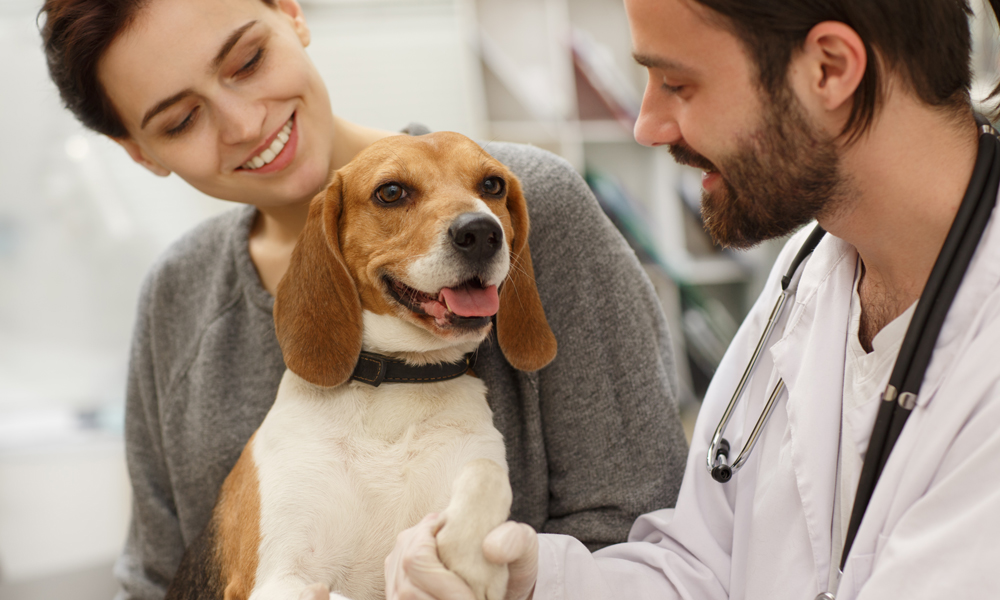Most healthy adult dogs should be taken to the vet at least once a year. But those visits can certainly happen more often, depending on the health, age and medical condition of your dog. In fact, dog owners end up taking their furry friends to the vet an average of 2.7 times a year, according to the APPA National Pet Owners Survey.
The main reason for annual wellness visits is you’ll want to ensure your pet’s health is on track. After all, dogs can’t speak up and tell you if something’s off or if they’re feeling ill. A vet will offer expert advice on keeping your pet happy and healthy, and how to get the most out of your years together.
Most importantly, in building a medical history for your dog, it will help your vet identify early warning signs of a more serious issue so your pet can get the treatment they need.
Wellness visits for adult dogs: What to expect
For most adult dogs (six months of age until they start showing signs of advanced age), an annual medical exam with a vet will suffice. Some 48% of dog vet visits are for routine physicals, according to the APPA National Pet Owners Survey. Here’s an overview of the annual wellness visit and what you can expect.
The examination depends on the needs of your dog’s breed and specific health concerns. But to ensure everything is healthy with your pet, your dog’s vet should do the following during your dog’s wellness visit:
- Listen to the heart and lungs.
- Examine eyes as well as the inside of the ears.
- Feel the dog’s body for any lumps and bumps.
- Check vital signs including temperature, pulse.
- Check and monitor the dog’s weight and condition, using the Body Condition Score, ensuring it’s in a healthy range.
- Take blood tests for anemia, organ diseases and thyroid disorders. The vet may also ask you to bring in a stool sample for parasite testing.
- Issue vaccinations and/or booster shots against rabies, canine hepatitis, kennel cough and Lyme disease, as needed.
Your annual wellness visit is also a time to ask questions you have about your pet’s health and well-being. For example, if your dog has itchy skin or is gaining weight, your vet can offer an expert perspective on what may help, based on what they know about your pet’s medical history, environment and breed.
Puppy vet care
After you get your puppy, the first thing that should be on your list is scheduling a wellness visit with a vet. Be sure and bring any paperwork and medical information that was provided to you. Following that initial visit, most vets recommend monthly wellness exams until the puppy reaches six months old, to ensure their healthy development. During that time, you can expect the following:
- A check of the puppy’s weight and growth to ensure it’s at normal levels for their breed and age.
- Starting at six weeks, puppies can start receiving vaccinations against illnesses like distemper-parvo, rabies and influenza.
- If you don’t plan on breeding, the puppy may be spayed or neutered any time after 8 weeks.
- Puppies may also begin flea and tick prevention treatment, if these are relevant to your region, as well as treatment against heartworm.
Senior dog vet care
Dogs of a certain age should get wellness visits more frequently. Precisely when your dog is considered a senior will depend on the breed and their overall health. Giant breeds like Great Danes show signs of advanced age at 5 or 6 years, while Chihuahuas may not start exhibiting these traits until they are 10. In general, most vets will say dogs enter their senior years at age 8 or 9.
- Older dogs benefit from two annual visits a year. Just as with older humans, older dogs have an elevated risk of developing more serious medical conditions, like cancer, heart disease, arthritis, liver disease and diabetes.
- Over time, older dogs may exhibit changes in their behavior, such as energy levels and how long they sleep. Keep note of these and convey this information to your vet.
- Older dogs are also prone to weight gain, so this may be a good time to ask your vet whether they recommend switching to a senior diet to help with weight control, while supporting your elder dog’s health needs.
Twice-yearly vet visits can help your dog’s vet detect problems early, so your dog can get the treatment and care they need to stay in top health and live long, healthy lives. The American Veterinary Medical Association has this handy Q&A for senior dogs.
Beyond the wellness visit: Is it time to go to the vet?
Beyond the annual, age-appropriate wellness visit, signs of sickness and injury can mean a trip to the vet. Sometimes, though, it can be difficult to decide if the thing that’s ailing your dog can clear up at home, or if it’s more serious. To guide your decision, these are four of the most common reasons pet parents take their dog to the vet, followed by how to know when it’s time to seek a professional opinion.
Skin allergies
Signs of skin allergies include itchiness (accompanied by frequent scratching and paw licking), loss of hair, skin infections and ear infections.
Should your dog go to the vet? You may suspect the source of this allergic reaction is environmental, such as pollen and dust. But diet can also be the culprit. As long as there’s no sign of infection in your dog, a simple dietary change may be all that’s needed to reverse this. A sensitivity to a protein may be preventing your dog from absorbing all the nutrients they need to achieve healthy skin. One effective solution is a single-source protein diet with limited ingredients, like Pure Vita. It features hypoallergenic ingredients, like venison, potato, duck, peas, oatmeal or salmon, helping your pooch get relief from the itchiness.
Ear infections
The telltale symptoms of an ear infection include head shaking, redness and swelling, and lots of scratching and pawing at the ears, accompanied by whining. A common cause is bacterial infections, but according to the AKC, some 80% of dogs with food sensitivities develop ear infections.
Should your dog go to the vet? Yes. When you suspect an ear infection, it’s important to have your dog seen and treated by a vet quickly, so the infection doesn’t spread to the inner or middle ear, leading to more serious problems. To prevent future infections, give your dog regular ear cleanings, and try switching your dog to a diet that introduces a new protein source, like duck or salmon, but omits common food allergens, like corn and wheat ingredients.
Skin bumps and masses
When you notice a new bump on your dog’s skin, there can be a number of benign reasons behind it. Fatty deposits are very common in older and middle-aged dogs, especially if they’re overweight. It can also be a cyst, abscess or wart.
Should your dog go to the vet? Only a visit to the vet can rule out whether that bump is something serious, so do have it checked out.
Diarrhea or upset stomach
Dogs are famous for eating things they shouldn’t. When your dog is showing signs of tummy problems, such as vomiting or messy stools, it’s hard to know if they got into something that’s disagreeing with their stomach. At the same time, tummy troubles are often a reaction to an ingredient in your dog’s food.
Should your dog go to the vet? Only if your dog seems ill and uncomfortable for several days or if their symptoms worsen. Otherwise, it may be time to evaluate your dog’s diet. A common cause of food allergies comes from a reaction to a protein ingredient, according to the American College of Veterinary Nutrition. The most common protein allergens can come from either meat or grain sources, including beef, dairy, chicken, lamb, egg, soy, pork, fish, wheat and corn.
Between vet visits, there’s NutriSource
At NutriSource, we prepare each batch so that every serving gives your dog all the nutrients they need to build a healthy body: healthy skin, fewer odors, and more energy. When you factor in the health benefits, we offer a great value. Pet parents have tried it and they love the results.
In addition to using better ingredients, each bag and can contains Good 4 Life, an exclusive blend of supplements that offer your dog the minerals and probiotic nutrients they need to build a healthy gut and a healthy body. Find NutriSource at your local, independent pet supply store.


